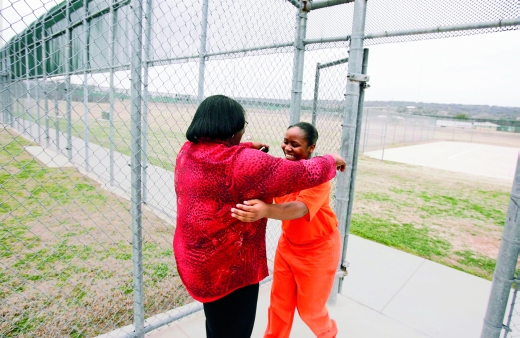
ShaQuanda, 16, made one bad judgment call and was sent to a youth prison. But if it weren’t for her, other girls would still be unjustly locked up.
As told to: Veronica Byrd
I grew up in Paris, Texas, a small town known for its beautiful colonial mansions, farms, and parks—and its racist history. In the early 1900s, blacks were burned to death at the local fairgrounds as a crowd of whites looked on. The racism isn’t as open now, but I feel like it’s basically a part of everyday life—even at my school, which is almost half black and Hispanic. Parents complained for years that black kids were being written up and expelled more often than white students who were caught doing the same things. I was in sixth grade when I was first written up (for scribbling on a desk in class). Soon after, my mom helped start a civil-rights group to look into the racism at school, and they eventually filed a complaint with the school district. But things got worse for me in high school. Within the first month of my freshman year, I was written up for being late, putting too much paint in a cup in an art class, and wearing a skirt an inch shorter than allowed. I know I’m not perfect, but I really began to feel like I was being targeted because I’m black.

SHOCKING CHARGES
One morning in late September 2005, I was waiting with other freshmen outside Paris High School because we weren’t allowed in the building until the bell rang at 8:25 A.M. My stomach was hurting, so I figured it’d be okay to go inside to get my ulcer medication from the nurse’s office. But as I hurried through the door, a teacher’s aide came at me with both of her hands up, yelling that I had to go back outside. I put my hands up too, and stumbled backward. It happened so fast. I thought she’d pushed me (but the aide said that I’d shoved her).
The aide told me to go to the principal’s office, so I knew I was in trouble, but I assumed I’d only get detention. I couldn’t believe it when a cop came into the room an hour later—and told me that I was being arrested. I was so scared—I didn’t even know what I had done! The officer put me in the back of a patrol car and took me to the station, where I was booked and fingerprinted.
My trial started on March 9, 2006, in juvenile court. I’d been charged with “assault on a public servant,” a third-degree felony in Texas. My lawyer argued that I’d pushed the aide in self-defense, and although she complained about shoulder pain, according to doctors she wasn’t injured. But it didn’t sway the jury. The prosecutor used my previous write-ups to make me look like a bad kid. The next day I was found guilty—and sentenced to up to seven years in a juvenile prison. When I heard that I’d been found guilty, I was shocked! I dropped my head on the table and started bawling.
LIFE, INTERRUPTED
In May I was sent to the Ron Jackson State Juvenile Correctional Complex, about 270 miles away from Paris. Seeing the barbwire fences and guards terrified me. I was given an orange jumpsuit and socks and taken to my quarters—a tiny room that only had a bed, a bookshelf, and a desk. Each day, the guards would wake us at 5:45 A.M. for breakfast. After meals I’d go to my room and just sit, pray, or sleep to pass time. I’d never been away from my family, and for months, I cried every day. All I could think about was how much I wanted to go home. I kept to myself, because I was afraid of the other kids there—some of them had committed serious crimes, like murder.
FREEDOM AT LAST
My life in prison was very routine, but outside the walls, a major revolt was brewing. My mom worked with the NAACP to get my story published in a major newspaper, which claimed that my punishment was racist, since white teens in my area who had committed worse offenses seemed to get off with much more lenient punishment. [Editor’s note: A spokesman for the Lamar County District Attorney’s office denies these claims.] After the article ran, civil-rights groups posted blogs and held protests against my unfair sentence.
A guard came to my room on March 30, 2007, and told me to go to the office. I didn’t know what was going on. The prison superintendent handed me the phone—it was my mom. I thought she was going to say she couldn’t come visit me that weekend. “I’m still coming,” she said. “But you’re coming home with me!” I couldn’t believe it—I just burst into tears.
When I was released the next day, I found out that after the uproar, officials in Texas had examined my case and decided to set me free. My first stop: McDonald’s for a Big Mac and fries!
But I wasn’t the only one set free. Over the next month, a committee reviewed the sentences of all 4,700 juveniles in Texas detention centers. Since then, more than 500 other young people have been freed—and there could be hundreds more!
Spending a year in prison changed my life. Now I’m planning to get my GED, and to one day go to law school and become a lawyer. I want to help teens in trouble. I feel lucky to have a second chance; they should all get one too.